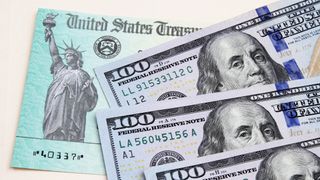Stimulus check: Here's how you can still get money
Tax deadline has passed, but you can still get a stimulus check

The official 2020 income-tax-filing deadline has passed, but it's not too late to claim missing stimulus check money if you're still owed a relief payment: Simply file your return anyway.
The Treasury Department has already largely distributed stimulus check 3 — the $1,400 direct payment provided by the Biden administration's American Rescue Plan — totaling more than $388 billion in relief to approximately 165 million individuals and families.
- Fourth stimulus check update: Status, proposed amount and latest news
- 2.2 million sign petition for monthly payments
- Plus: Stimulus check: Don't throw out this Biden letter
Many Americans are still receiving so-called "plus-up" payments, which are supplemental funds for those who got their third stimulus check earlier this spring (prior to filing their 2020 taxes) but who then qualified for more money based on their 2020 income. These are being distributed automatically as returns are processed.
The IRS is also sending checks to eligible individuals who previously didn't have tax information on file as soon as the IRS processes their returns. This includes people who don't have a permanent address or who have very little or no income.
But there are some people who may still be able to get more stimulus relief: Individuals who made less in 2020 than they did in 2019 are able to claim additional funds from stimulus checks 1 and 2, which totaled $1,200 and $600, respectively, using the Recovery Rebate Credit on Line 30 of Form 1040 or Form 1040-SR.
If you've already submitted your tax return without this claim but believe you're eligible for the Recovery Rebate Credit, you can send in an amended tax return.
According to CNBC, Americans have until Oct. 15, the extended return due date, to file for missing money. Plus, tax refunds (like the Recovery Rebate Credit) can generally be claimed for up to three years after the official deadline.
Sign up to get the BEST of Tom’s Guide direct to your inbox.
Upgrade your life with a daily dose of the biggest tech news, lifestyle hacks and our curated analysis. Be the first to know about cutting-edge gadgets and the hottest deals.
Bottom line: If you're still owed some stimulus relief, get your return in or amend what you've already submitted.
Some stimulus checks remain uncashed
More than a million Americans failed to cash the first round of stimulus checks provided by the March 2020 CARES Act, according to the Boston Herald. The IRS has said that the number includes funds paid back or left uncashed.
The Herald did not specify who received those payments, but it's possible that some of those checks went to people who moved without leaving forwarding addresses or who had passed away since filing their 2018 tax returns.
The uncashed checks are less than 1% of the estimated 130 million stimulus payments provided by the CARES Act, but they may end up being a talking point for politicians and pundits opposed to a fourth round of stimulus checks.
Emily Long is a Utah-based freelance writer who covers consumer technology, privacy and personal finance for Tom's Guide. She has been reporting and writing for nearly 10 years, and her work has appeared in Wirecutter, Lifehacker, NBC BETTER and CN Traveler, among others. When she's not working, you can find her trail running, teaching and practicing yoga, or studying for grad school — all fueled by coffee, obviously.

